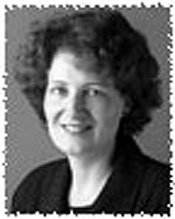It seems religion writers deal more in theory than fact. How does a good reporter write an accurate story when people’s understanding of truth differs?

By Susan Hogan/Albach
The Dallas Morning News*
Never take at face value that anyone has the truth about Scripture. Most religious traditions disagree over how to interpret sacred texts. Just look at the debate over homosexuality threatening to splinter some Christian denominations.
Some Christians insist the Bible clearly states homosexuality is sin. Others say that if studied closely, the Bible says no such thing. Still others say the Bible denounces homosexuality only because of the mindset of the times.
Know where your source comes down. Explain it. Then put it in context. Let readers know it’s one of several viewpoints.
Many sources will insist their perspective is the only correct view. Don’t count on them to provide accurate information on alternative interpretations. Poke around. Consult scholars, priests, rabbis, imams-depending on the faith tradition you’re writing about. Make sure you gather information from different schools of thought.
Be aware that many people interpret the words of Scripture literally. If the Bible says a whale swallowed a man named Jonah, then that’s what happened. People with this perspective often say the Bible is without error because God is the author.
The Bible says what it means and means what it says, they are fond of saying.
Others look beyond the literal words to their historical, sociological or literary context. Whether Jonah ever existed or was swallowed by a whale is less important than the lesson the biblical authors wanted to convey with this story.
Those with this approach often assert the Bible is the work of many human authors writing from the lens of faith. Because the authors lived in different historical periods, their stories aren’t always identical, and sometimes appear contradictory.
People with this view may say, for instance, that the author of the first chapter of Genesis differs from the author of Isaiah 45 over whether God created darkness. Genesis says darkness already existed when the world was formed.
But Isaiah credits God with saying: “I form light and create darkness.”
Biblical literalists do not find the passages contradictory but an extension of the same thought. Non-literalists say two authors with different points of view wrote the passages.
These aren’t the only approaches to Scriptural interpretation, but they show the kind of tension that exists. Reporters need to be mindful to capture the nuance, which is sometimes as difficult as walking a tightrope.
Avoid labels such as “conservative” and “liberal.” Instead, describe your source’s viewpoint.
Here’s one reason why: Not all biblical literalists are alike. They may agree that the Bible is all a person needs to know for righteous living. But they may disagree over, say, whether Genesis contains two creation accounts or one continuous story.
It’s not enough for re-porters to describe differences. They need to understand why the differences exist.
Until the Enlightenment, the Bible was looked upon largely as a bedrock of history. The rise of scientific approaches to studying the Bible changed that.
What’s known as the historical-critical method of studying the Bible began in the early 19th century. It revolutionized the way many people interpreted Scripture. Instead of viewing the texts as an accurate history, they were looked upon as a compilation of oral, written and edited traditions melded together.
The scientific study of the Bible caused some scholars to question the texts like never before. They said they discovered different forms of literature in the Bible, from poetry to liturgical prayers. Some also said they found inconsistencies.
But for many of these scholars, the new methodologies didn’t lessen the significance of the Bible or call to question their faith. Rather, it broadened their understanding.
Today, for instance, many look upon the New Testament as a reflection of the faith of the early Christian church rather than a factual history. Biblical literalists, who tend to reject modernity, are also leery of scientific approaches to Scripture.
The sensitivities over sacred texts among Christians are also found among Jews, Hindus, Muslims and other people of faith. The wise reporter will be sensitive to this and tread cautiously.
*This article was written in 2001, at the time Susan Hogan/Albach was writing for the Dallas Morning News. She no longer works for that publication.
